MP Calls for Ensuring Psychological Help for All School-Goers
ZAGREB, 1 Oct 2021 - GLAS party leader and MP Anka Mrak-Taritaš has submitted a conclusion to the parliament calling on it to oblige the government to make sure all school-goers have access to psychological help due to the negative impact of the coronavirus pandemic and earthquakes as of the next school year.
Mrak-Taritaš told a press conference on Friday that the Zagreb Institute for Social Research recently published a survey covering 27,000 students, 417 experts and 4,796 teachers.
The survey showed that the coronavirus pandemic has negatively or extremely negatively impacted the lives of most students, affecting their motivation and mental health.
"It is particularly concerning to learn that depression and anxiety have increased significantly among students, as have phobias and fear... Also, a large number of Croatian students live in areas that were affected by the earthquakes and they certainly feel the consequences of those traumatic events," she warned.
Only 43% of schools have a psychologist employed
Mrak-Taritaš warned that the State Pedagogical Standard is not being respected in the school system and that a survey showed that as many as 233 elementary schools employ fewer professionals than stipulated by regulations, and only 43% of schools have a psychologist employed.
She noted that 880 elementary schools have a total of 340 psychologists employed which means that about 130,000 primary school pupils do not have access to psychological help. That means that one psychologist is responsible for an average of 925 students, said Mrak-Taritaš.
According to the electronic records of the Ministry of Science and Education, currently 47% of elementary schools and 55% of secondary schools have an employed psychologist, said Mrak-Taritaš.
For more on politics,CLICK HERE.
Online Appeal for Social Workers Signed by 1,500 People
ZAGREB, 1 Oct 2021 - An online appeal, entitled "Let professionals do their job without being exposed to pressure!", has been signed by more than 1,500 people, including psychologists, social workers and other experts working with children.
The appeal was aimed at warning the competent authorities and public of the extremely negative and dangerous potential effects of the public lynching campaign to which experts in the social protection system have been exposed to over the past few years and which has recently escalated again, the initiators of the appeal said.
"It causes irreparable damage not only to professionals but primarily to children and families, current and future users/patients, who are the most vulnerable group that deserves adequate professional help."
"Do not let cases like the ones in Đakovo and Split happen again due to calls for lynching on social networks and in the media," the signatories to the appeal said.
"Let us do our job and support us in cases of suspected violence against children instead of discouraging us through your actions or lack of them," it is said in the appeal, which was launched by psychologists Andreja Bogdan, Gordana Kamenečki and Josip Lopižić, and social worker Štefica Karačić.
For more news, CLICK HERE.
Solar Energy Conference: Procedures Need to Be Stepped Up
ZAGREB, 1 Oct 2021 - The solar sector is developing very slowly in Croatia even though the price of solar energy has never been lower, hence it is necessary to encourage greater efficiency by the competent institutions and to educate citizens, a two-day solar energy conference on the island of Hvar heard on Friday.
"The price of electricity from solar power plants today is lower than ever but Croatia's solar sector is developing very slowly and the relevant procedures need to be stepped up and people need to be educated," Professor Neven Duić of the Zagreb Faculty of Mechanical Engineering and Naval Architecture said at the conference.
The conference, entitled "Days of the Sun", brought together key stakeholders in Croatia's energy transition - members of the academic community, equipment producers, representatives of the banking system, investors, regional and local government officials as well as representatives of state institutions and ministries.
Apart from discussing various financial models for the solar sector and its launching, the conference will discuss the new legislative framework for the green transition, the future of photovoltaic power plants and solar technology in Croatia, innovations and application of solar energy in the business sector, the use of renewable energy sources in agriculture, and the implementation of the EU Green Deal at the national level.
"Local government has an opportunity to be more active in the coming period to inform citizens and promote the use of renewable sources, develop strategies and plans and actively participate in investments... these projects bring concrete benefits that can have a positive effect on the communities they govern," said Maja Jurišić of the Island Movement association, one of the organisers of the conference.
She underscored that renewable energy sources should be treated as a public good.
The director of SolarPower Europe, Walburga Hemetsberger, underscored that the solar energy sector was expected to grow significantly over the next five years, primarily due to the acceptable costs of such projects.
SolarPower Europe is a leading European organisation of stakeholders in the use of solar energy and it comprises research centres, banks, investors, entrepreneurs and others in the solar energy sector.
Commission Quashes Zagreb Mayor's Decision on Bulky Waste Tender
ZAGREB, 1 Oct 2021 - The State Commission for the Supervision of Public Procurement Procedures has quashed a decision by Zagreb Mayor Tomislav Tomašević and the city will have to complete a previous tender and sign a preliminary agreement with the Reoma Group or Petar Pripuz's Cezar company, Večernji List reports on Friday.
Mayor Tomašević recently cancelled a tender for the recycling of bulky waste, explaining that the city did not need privately owned companies to do it because its Čistoća public sanitation company could do the job.
Two bids had been submitted to the tender, one by the Reoma Group, which offered to recycle the city's bulky waste for HRK 89 million and one by Cezar, which offered to do it for HRK 125 million.
The public procurement procedure itself was advertised in December 2020 but the previous city government did not make a decision on the matter, explained Tomašević, who took office after the May 2021 local elections.
Tomašević in September announced that the city would purchase crushers for bulky waste and that one was already being tested. Meanwhile, he sent some of municipal bulky waste to Sisak to be recycled by the local Royal Media company because of problems with the necessary licences and procurement so currently bulky waste from Zagreb is crushed in Sisak and taken back to Zagreb's Jakuševec landfill.
Tomašević now faces one more obstacle - the State Commission for the Supervision of Public Procurement Procedures and the Reoma Group, whose complaint against his decision to cancel the tender has been accepted by the Commission.
The State Commission for the Supervision of Public Procurement Procedures has concluded that there were no grounds for Tomašević's decision to cancel the tender because it believes that the city's explanation that it has only now become aware that it can recycle bulky waste on its own cannot be true.
For more on politics, CLICK HERE.
Arable Land Prices Increase by HRK 746 per Hectare on the Year
ZAGREB, 1 Oct 2021 - The average price of arable land in Croatia in 2020 amounted to HRK 25,930 per hectare, which is HRK 746 more than in 2019, the Croatian Bureau of Statistics (DZS) reported on Friday.
The statistics indicate that in 2020 the average price of meadows increased by HRK 3,326 to HRK 17,289 per hectare and of pastures by HRK 2,193 to HRK 15,651 per hectare.
In the Pannonian Croatia, the average price of arable land purchased in 2020 was HRK 26,416 per hectare, of meadows HRK 18,868 per hectare and of pastures HRK 10,720 per hectare.
The average price of arable land along the Adriatic coast was HRK 33,640 per hectare, of meadows HRK 13,957 per hectare and of pastures HRK 20,423 per hectare.
In northern Croatia, the average price of arable land was HRK 22,518 per hectare, the average price for meadows was HRK 18,981 per hectare and for pastures HRK 16,986 per hectare.
The DZS notes that its data is based on Tax Administration data on farmland purchases.
(€1 = HRK 7.491)
For more news, CLICK HERE.
PM: We Didn't Join EU to Take as Much Money as Possible, EU Values Important
ZAGREB, 30 Sept 2021 - Prime Minister Andrej Plenković said on Thursday that Croatia had been an EU member for eight years, that it had experience and was respected, and that getting as much money as possible was not the reason it joined the EU but that the values and principles on which the EU was founded were more important.
The EU is founded on democracy, human rights protection, rule of law, market economy and, most importantly, the Christian principle of solidarity, which imbues all EU policies, he stressed.
Plenković was speaking at the opening of a two-day hybrid conference called "Days of regional development and EU funds - New opportunities" in Opatija, at which the Multiannual Financial Framework 2021-2027, the National Recovery and Resilience Plan, project results and new challenges will be presented.
Croatia got HRK 50bn more from EU budget than it paid
Plenković said that Croatia had obtained around HRK 50 billion more from the EU budget than it had paid into it, citing as an example the COVID-19 crisis, when EU member-countries joined forces and invested in protective equipment, control and research that enabled the vaccine and gradual restoration of life to normalcy.
He noted that central and eastern European countries in transition had been part of undemocratic systems and that their main preoccupation was how to catch up with those that had developed in democratic systems and were more developed, estimating that Croatia would catch up with those countries around 2030.
He recalled that the cost of the COVID-19 pandemic in 2020 was HRK 35 billion, while damage caused by two destructive earthquakes amounted to HRK 129 billion, stressing that €25 billion had been secured from the EU for Croatia's development in the coming period.
Plenković underlined the importance of informing citizens about the additional benefits of Croatia's EU membership.
"That framework is important to us now that we have political peace, local elections have just been held and we have a government that has three years until the next parliamentary elections, which is almost a unique case," he said.
He added that the parliamentary majority was strong and stable, based on trust between the HDZ, minority deputies and liberal parties, and that it would remain stable for the next three years.
Five goals of economic development
He said that Croatia had weathered the crisis without major problems and lay-offs, that the 2020 tourist season reflected the circumstances, while this year's season was beyond expectations.
Plenković noted that economic growth would exceed projections and underlined five goals - greater convergence with more developed countries, using EU funds for even regional development, green and digital transition, using EU funds for local development and improving the standard of living.
He said that the incumbent government wanted entry to the Schengen area and the euro area to be its legacy, underlining the responsibility of all political parties in contributing to efforts to explain to citizens the benefits of membership of the two areas.
The National Recovery and Resilience Plan is a new instrument that will require expediency, with deadlines being shorter, he said, calling on everyone to cooperate and make sure projects were good.
Minister: Croatia must be able to introduce euro in 2023
Regional Development and EU Funds Minister Nataša Tramišak said the past year had been very successful in terms of absorption of EU funds.
We have adopted a number of important regulations, created a new framework for regional development and EU funds, and we are entering a period in which funds made available to us have never been higher, she said.
Finance Minister Zdravko Marić said that one of the government's strategic goals at the start of its term was the consolidation of public finances, noting that the introduction of the euro depended on meeting a number of criteria.
We must do our best to make Croatia able to introduce the euro in 2023, he said.
The conference in Opatija was organised by the Regional Development and EU Funds Ministry as an opportunity to exchange experience, network and strengthen cooperation to more efficiently implement projects in the new financing period in which Croatia will have around €25 billion at its disposal, to be used as part of the 2021-2027 Multiannual Financial Framework and the National Recovery and Resilience Plan.
For more on politics, CLICK HERE.
Croatia Logs 1,517 New COVID-19 Cases, 10 Deaths
ZAGREB, 1 Oct 2021 - Croatia has registered 1,517 new coronavirus cases and 10 COVID-19-related deaths in the last 24 hours, the national coronavirus response team reported on Friday.
The number of active cases now stands at 8,990, and 738 infected persons are receiving hospital treatment, including 99 who are on ventilators.
Since 25 February 2020, when the first case was confirmed in Croatia, 406,307 people have been registered as having contracted the novel virus, of whom 8,650 have died and 388,667 have recovered, including 1,392 in the last 24 hours. 23,044 people are currently self-isolating.
To date, 2,833,156 people have been tested for the virus, including 10,126 in the last 24 hours.
A total of 3,436,799 doses of vaccines have been administered, with 44.92 percent of the total population, or 53.89 percent of adults, having been vaccinated. 1,822,966 people have received at least one dose and 1,709,647 have been fully vaccinated, which makes up 50.62 percent of the adult population.
For more news, CLICK HERE.
New Bronze Sculpture of Šibenik Unveiled In the City
October 1st, 2021 - As in Zagreb, Split, and other Croatian cities, a new bronze sculpture of Šibenik has been officially unveiled and warmly received by city residents. It is a scale sculpture that serves as a miniature of the Dalmatian city, and now adds to its various attractions.
As reported by Slobodna Dalmacija, eight hundred kilograms of clay, 1.5 tons of bronze and almost two years of hard work, sculpting, studying the theory of space, mathematics, and geometry were all needed by the Zagreb painter-graphic artist with Šibenik address Zvonimir Vila to create his city plan in volume, a new bronze sculpture of Šibenik called Šibenik stina. It was placed on the square in front of Krešimir's home where the city administration is located, and it was ceremoniously opened on Wednesday night on the Day of the City of Šibenik.
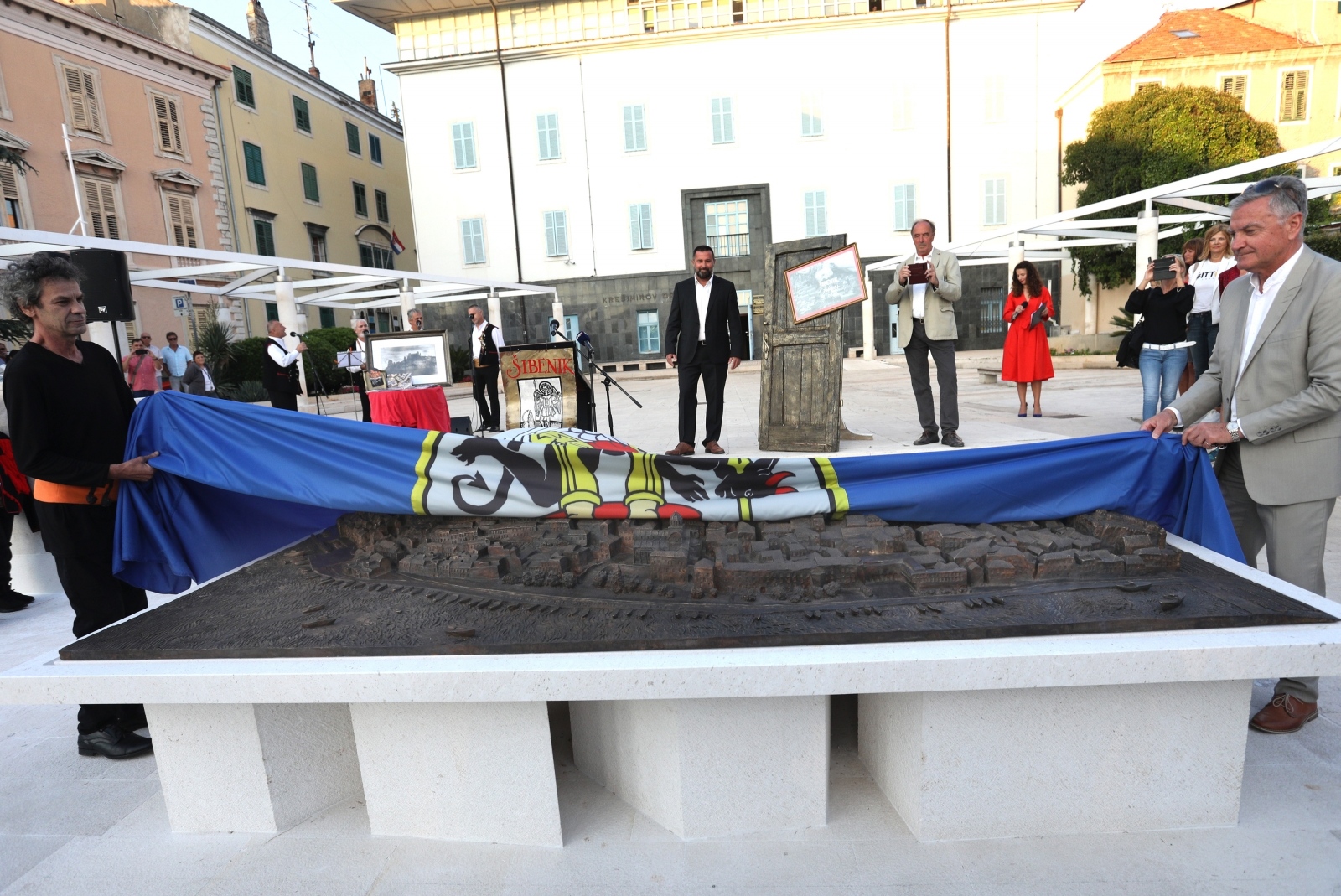
Photo: Dusko Jaramaz/PIXSELL
Other cities have models, mostly industrially processed, but Šibenik got a work of art, high relief, in fact, a sculpture of its historic city center that creates a story of space, brings emotion, and leads the viewer to the old Šibenik streets, rocks, thighs, and squares, points to its historical and cultural heritage as well as the very life of Šibenik, as the mayor of Šibenik Željko Burić said, satisfied that Šibenik is now a part of that life.
The creation of the sculpture, which Vila determined the dimensions of 4x2 meters on a pedestal about 60 centimeters high, was initiated by the Šibenik Tourist Board, and the money was provided from European funds.
''The goal was initially to make a model of the city center as our largest and most valuable resource and potential, as other cities have. However, we decided to give it to our Zvonimir Vila, who made a sculpture out of the model. The process was long, there were technical, financial, and administrative problems, and the pandemic bothered us. The new bronze sculpture of Šibenik is there now and I am overjoyed about it. Šibenik has gained another cultural value and tourist attraction'', said Dino Karađole, director of the Tourist Board.
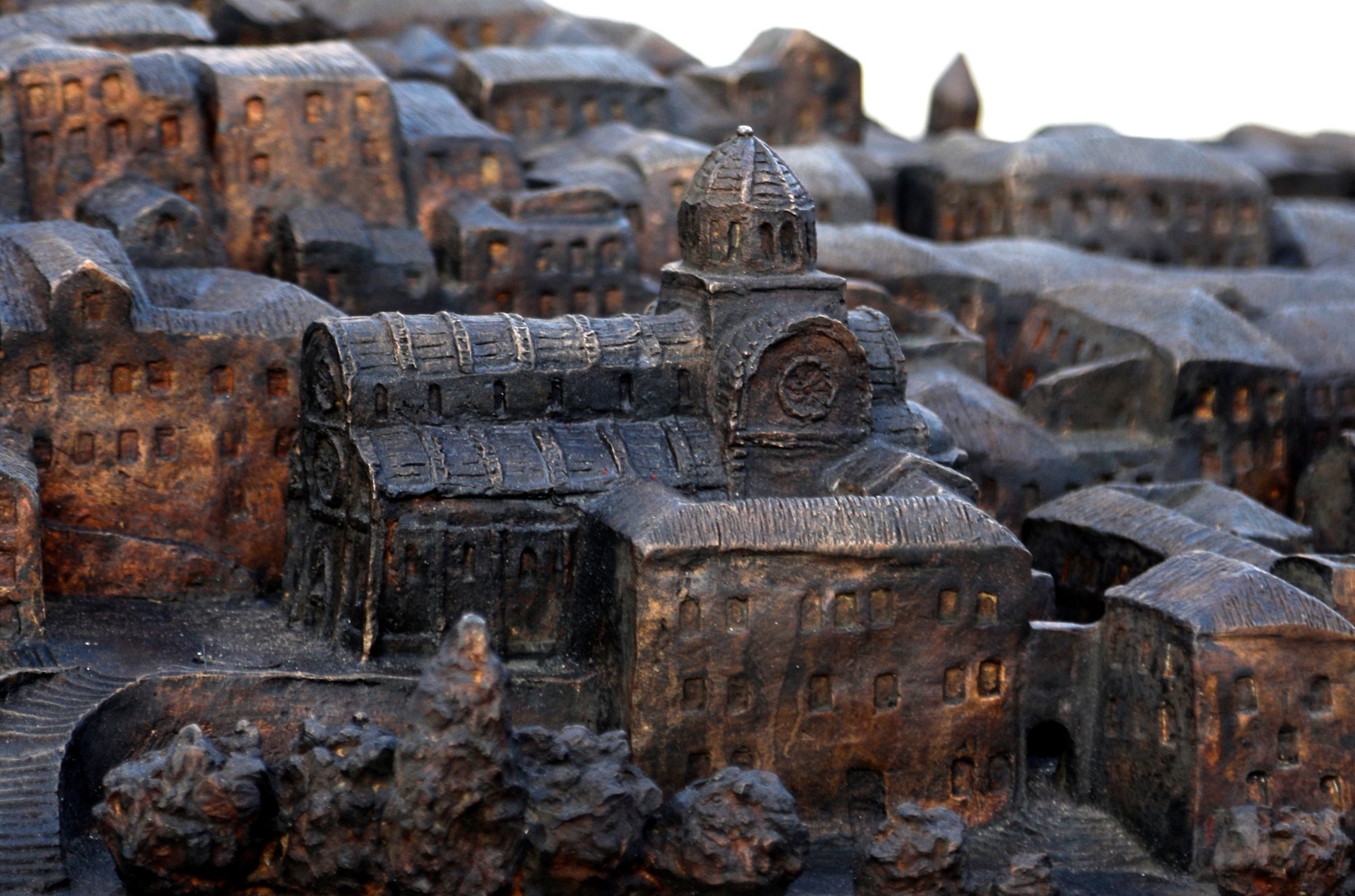
Photo: Dusko Jaramaz/PIXSELL
''I am glad to be in my city tonight and I just told the mayor that I don't recognize anything anymore. Whether it is good or not, I do not know, but I know that this sculpture, it is good that you call it that, and not a model, speaks of the spirit of Šibenik. However, why this sculpture on this day, the feast of St. Michael? Simply because saints personify cities. That symbiotic relationship between a saint and a city, an equation that has been confirmed in a thousand examples. What are St. Vlaho, St. Duje, St. Krševan to Dubrovnik, Split, Zadar, it is St. Mihovil to Šibenik. I think it is a happy choice that this work was given, not so much to the sculptor, but to the graphic artist, because he succeeded in what is most important in Šibenik, and that is the labyrinthine feeling you have in this city of incredible topography. If you were to make a model, 3D, 4D or as it is done today, you would get a good informative picture, but here you have a real work of art'', said the art historian dr. Sc. Josip Belamarić.
''I did this quite emotionally and hard. When I took the job, I knew it wasn’t easy, but it was challenging. The sculpture was made with the classical sculptural technique, first in clay, and later also with the classical method in bronze by his colleague Ante Jurkić, who did a great job of casting'', said Vila, the author, also thanking all of those who supported him in the arduous and long process of creation, especially many citizens and tourists peeking into his studio while he worked.
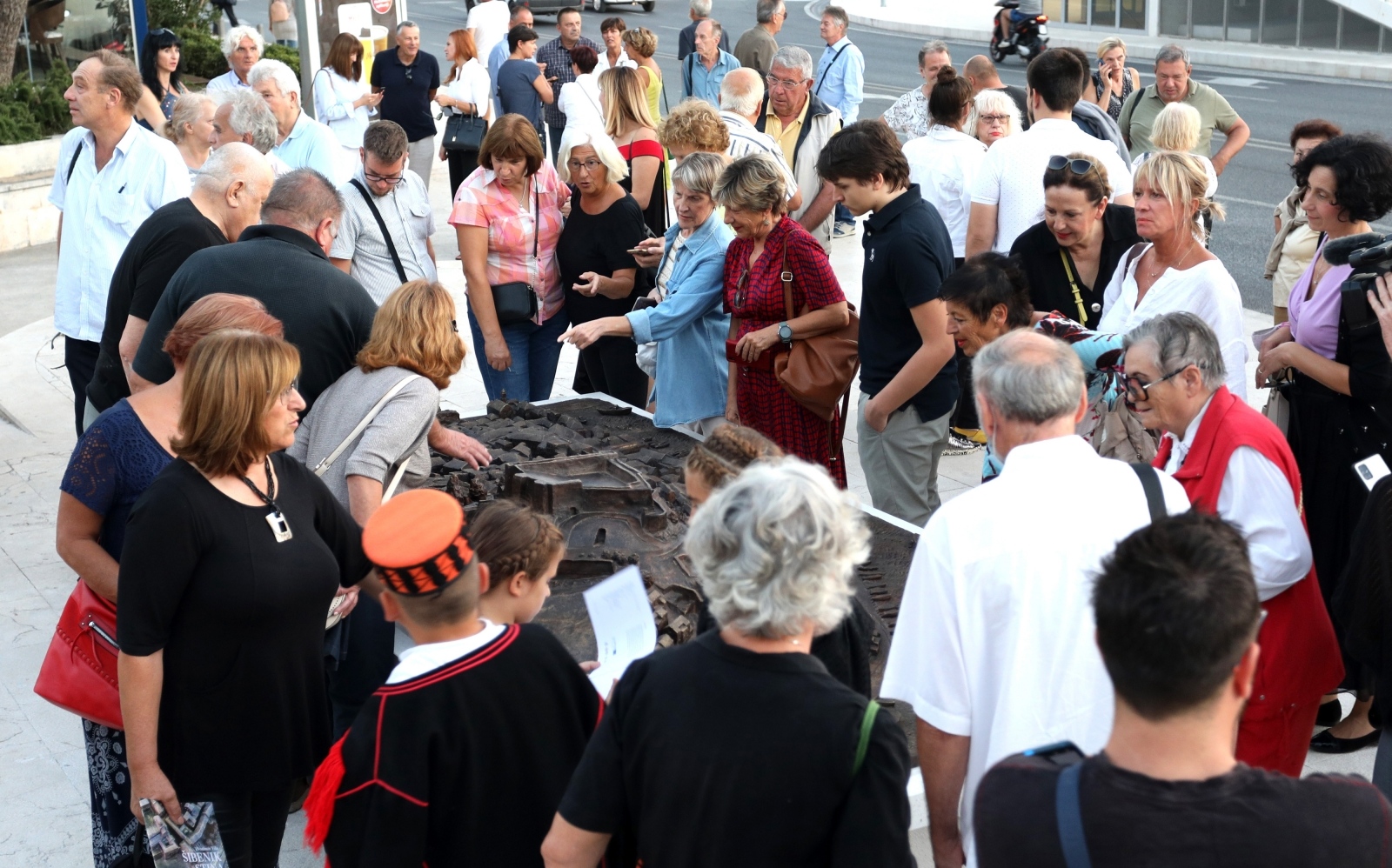
Photo: Dusko Jaramaz/PIXSELL
Vila also admitted that he would have preferred his work, as originally planned, to be located in Poljana. Nothing is more logical, he says, than for the sculpture of the old town to be in the old town, and not outside its borders, although only 50 meters from Poljana. However, the authors of the architectural-urban project of arranging Poljana did not accept this proposal.
In any case, the people of Šibenik will not be bothered by the location of the new bronze sculpture of Šibenik. A large number of people came to discover the sculpture, and the strong congratulations to Vila and numerous selfies were taken on the first evening near Šibenik stina.
For everything you need to know about the historic city of Šibenik and all things you can do and see, be sure to check Total Croatia's guide: Šibenik in a Page. Now in your language!
For more made in Croatia news, follow TCN's dedicated page.
Zagreb Rapid Antigen Test: Results in 16 Minutes, Price 150 Kuna
October 1, 2021 - Where to find an affordable, walk-in Zagreb rapid antigen test with almost immediate results? Can we beat 16 minutes and 150 kuna?
A year ago, the only thing I seemed to write about was coronavirus. Providing life updates and several daily articles on such a depressing topic was pretty soul-destroying at times. And while the comprehensive corona coverage continues on TCN, I have largely tuned out of the latest situation, leaving it to my capable colleagues to handle.
Being fully vaccinated, I encounter few restrictions, and I have not kept up-to-date with the latest developments on testing etc.
So when I received an invitation to attend the premiere of the new James Bond movie last night, I asked my teenage daughter if she would like to be my plus one for the night. She did indeed, but we had a little bit of bureaucracy to jump though. As proof of vaccination or negative test was a prerequisite for all attendees, I found myself looking around for an immediate Zagreb rapid antigen test centre so that my daughter could join me at the Bond movie.
I had assumed that the concept of walkin tests would be fairly well-established by now. A couple of friends suggested I try the Andrija Stampar Institute which was both quick and reasonably priced. So into the car we hopped and headed up the hill to northern Zagreb.
My heart sank. A notice by the entrance that all tests needed to be booked in advance was confirmed at the gate. I had the option to walk 20 metres and sign up for an immediate PCR test, cost 450 kuna, and no, they were not aware of any other Zagreb rapid antigen test with immediate results.
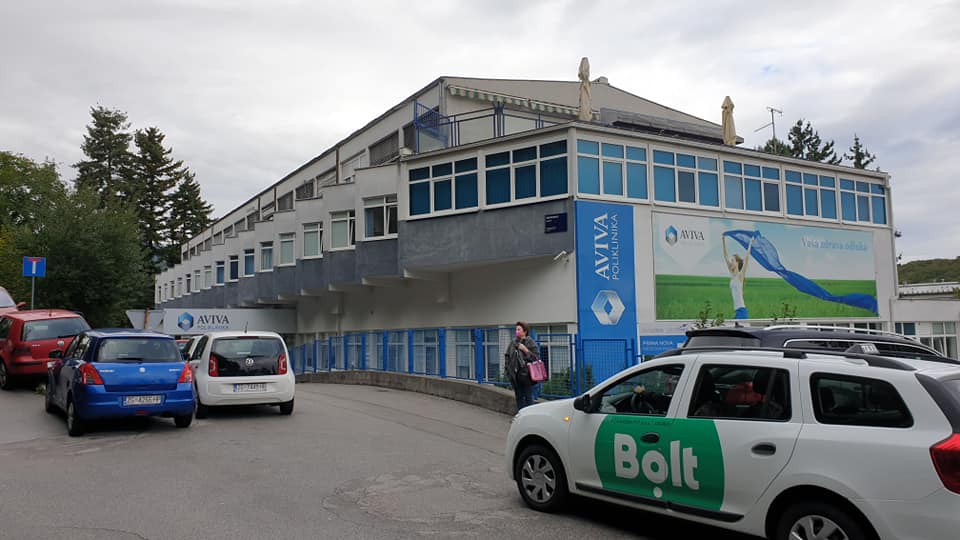
Time was not on our side. Not only did we need to get the test and the result the same day, but we also had to get home and ready for school. Perhaps I should not have been surprised, but I genuinely was at the seemingly lack of availability of such an important service. With more and more events requiring such confirmations, I thought a quick service would be more widely available.
A little more research online and asking around at Stampar all pointed to the same solution - a walk-in test option with immediate results at Prima Nova on Nemetova Ulica 2, some 5 minutes further nother from the Andrija Stampar Institute.
Located next to Polyclinic Aviva, Prima Nova came up trumps with outstanding service that I could only have dreamed of. There was zero queue, we were asked if we wanted to talk in Croatian, English, German, Italian or Spanish, and we were given the option of an email result or waiting 15 minutes for a hard copy. Total price 150 kuna.
Having learned that a paper in the hand is worth two in the promised email, we decided to wait. And we were soon rewarded - just 16 minutes after taking the test, the all-important stamped hard copy of a negative test - 007, here we come.
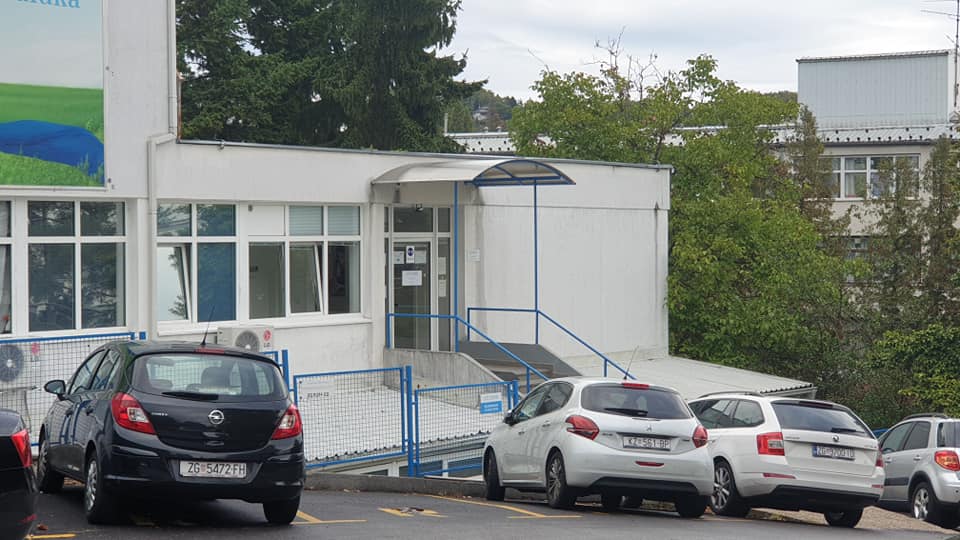
Prima Nova is on the right of the Polyclinic Aviva through this entrance door. Excellent service at what seems to be the quickest time and most competitive price.
Does anyone have a better experience and we will add to this article? Contact us at This email address is being protected from spambots. You need JavaScript enabled to view it. Subject Testing
The Zagreb Tourist Board has an up-to-date list of all the testing points in the city, including prices, waiting times, translations, and whether or not you need to order.
For the latest news on coronavirus in Croatia, follow the dedicated TCN section.
The Total Croatia travel update also has lots of useful information on coronavirus in Croatia.
Siege of Dubrovnik 30th Anniversary: Adriatic Pearl Remembers
October 1, 2021 - The Siege of Dubrovnik 30th anniversary is marked today in the Adriatic pearl.
During the early hours of the 1st of October, 1991, the JNA's barbaric attack on Dubrovnik and the surrounding area began.
During the hazy hours of dawn, exactly 26 years ago, the Yugoslav People's Army (JNA), readily aided by Serbian-Montenegrin aggressors, began their primitive and senseless attack on the Pearl of the Adriatic, the surrounding areas, on land, sea, and from the air. The innocent city remained without electricity and water, rendered almost entirely cut off from the rest of Croatia, and indeed from the world.
In a conscious effort to establish their overall goal of completely cutting Dubrovnik off from any possibility of help from elsewhere as they began on their path of the needless and wanton destruction of the city, the aggressors rocketed the repetitor, relay and information building located on top of Mount Srdj, causing an interruption of telephone lines and severe damage to radio links.
October the 1st, 1991, marked the beginning of a horrendous and unjustifiable attack on the arts, history, culture, innocence, and perhaps above all else - peace. Peace had been associated with Dubrovnik since the glorious days of the Dubrovnik Republic (Ragusa), a formerly autonomous, self-governing republic which promoted the then very progressive ideas of peace, equality, human rights and diplomacy during the tumultuous era which was all but dominated by the Ottoman Empire, the jealous Venetians and the Mediterranean shipping crisis.
To witness the city which banned slavery before the United States even existed as a nation and upheld the meaning of freedom and individuality in the face of a disagreeing outside world attacked by the backward ideals of the JNA, intent on raising the UNESCO World Heritage Site to the ground for absolutely no clear reason, was an event so deeply shocking and painful to the world that it rightly earned the Yugoslav People's Army international condemnation, and caused an enormous public relations disaster for both Montenegro and Serbia, cast aside by the international community.
The vile behaviour seen directed towards Dubrovnik only continued to further Serbia and Montenegro's political and economic isolation, earning them extremely powerful enemies across Europe, one of the most outspoken being former British Prime Minister Margaret Thatcher, and the world.
On Friday, the people of Dubrovnik mark the 30th anniversary with the traditional program "Let's Not Forget".
The program begins at 9:30 with the laying of wreaths at the Memorial Cross at the city cemetery Boninovo, followed by the laying of wreaths on Srđ hill with prayer. The International Scientific Conference "Dubrovnik Media Days" will be opened at 5 pm with the 30th-anniversary theme, and at 6 pm wreaths will be lowered in the Gruž port in memory of those killed at sea. Holy Mass for all those killed in the Homeland War will be held at 7 pm in the Franciscan Church, and at 8 pm in the Cinema Sloboda, the film "From That Day" by Slavica Šnur will be shown.
For more news in Croatia, follow TCN's dedicated page.


